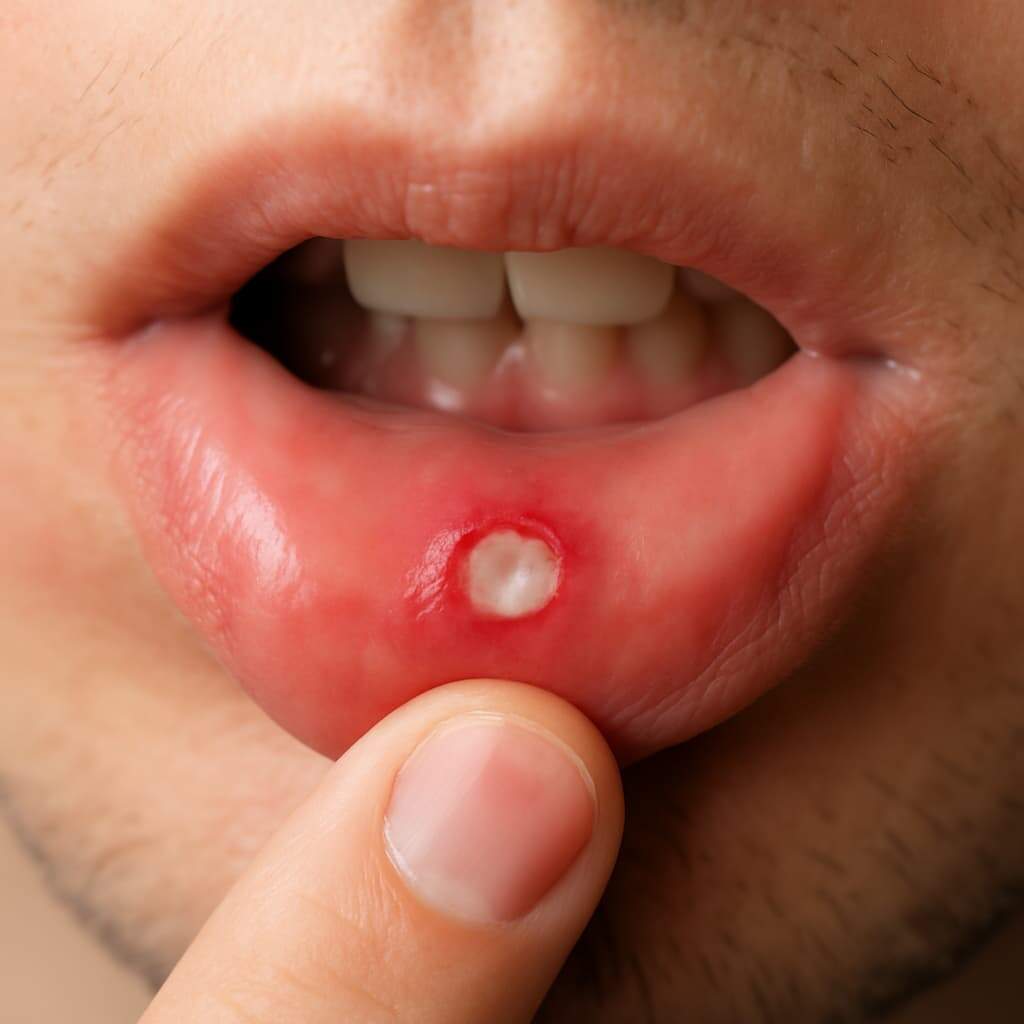Mouth ulcers, also known as canker sores, are those annoying little sores that pop up inside your mouth and make everyday things like eating, drinking, and even talking a pain. While they’re usually harmless and go away on their own, they can be frustrating and painful, especially when they keep coming back.
In this article, I have broken down the causes of mouth ulcers, how to treat them, and when to see a doctor.
What Are Mouth Ulcers?
Mouth ulcers are small, painful sores that show up inside your mouth on your tongue, gums, lips, inner cheeks, or even the roof of your mouth. They can be red, white, or yellow, and you might have one or several at a time. They’re not contagious and most heal within a week or two.
There are different types of mouth ulcers:
- Canker sores (aphthous ulcers): The most common kind, often triggered by irritation or stress.
- Oral thrush: Caused by a yeast infection.
- Leukoplakia and erythroplakia: Can appear as white or red patches and may signal more serious health concerns.
- Oral lichen planus: Often linked to immune system disorders.
- Cold sores: Though commonly confused with ulcers, these are caused by the herpes virus and are highly contagious. They appear on or around the lips and can be filled with fluid.
ALSO READ
What Causes Mouth Ulcers?
There’s no single cause of mouth ulcers, but several factors can trigger them or increase your risk. These include:
- Accidental cheek or tongue bites
- Minor injuries from dental work, braces, or rough brushing
- Allergies to certain foods or oral bacteria
- Reactions to toothpaste or mouthwash with sodium lauryl sulfate (SLS)
- Acidic foods like citrus fruits, pineapple, and tomatoes
- Deficiencies in vitamins and minerals, especially B12, iron, folate, and zinc
- Hormonal changes during menstruation or pregnancy
- Stress and lack of sleep
- Certain infections (bacterial, viral, or fungal)
- Chronic health conditions like:
- Celiac disease
- Crohn’s disease or ulcerative colitis (IBD)
- Diabetes
- Lupus and other autoimmune disorders
- HIV
Common Symptoms
Here’s how you can tell if you’re dealing with a mouth ulcer:
- Painful sore(s) inside the mouth
- Redness around the affected area
- Increased pain when eating, drinking, or brushing
- Swelling or tenderness
- White, yellow, or gray patches in the center of the sore
You might have one ulcer or several at once. While uncomfortable, most ulcers are harmless and heal without treatment.
Types of Canker Sores
There are three main types of canker sores:
- Minor Canker Sores: Small, oval-shaped, and heal within 1 to 2 weeks without scarring.
- Major Canker Sores: Larger, deeper, may last several weeks, and can leave scars.
- Herpetiform Canker Sores: Tiny sores that appear in clusters and may merge into one large sore. Despite the name, they’re not caused by the herpes virus.
When to See a Doctor or Dentist
While most mouth ulcers are nothing to worry about, you should see a healthcare provider if:
- Ulcers are unusually large or painless
- New sores show up before old ones heal
- They last longer than three weeks
- You’re experiencing extreme pain or difficulty eating/drinking
- Sores spread to the outer lips
- You have a fever or diarrhea when ulcers appear
- A persistent or recurring sore could be a sign of a more serious condition, like oral cancer or an autoimmune disorder.
Treatment Options: From Home Remedies to Medication
Most mouth ulcers go away on their own, but if you’re looking for relief or faster healing, try these remedies:
Natural/Home Remedies:
- Rinse with saltwater or a mix of baking soda and water
- Apply milk of magnesia or a baking soda paste directly to the sore
- Use a cold compress or place a damp tea bag on the ulcer
- Avoid spicy, salty, or acidic foods
- Stay hydrated and maintain good oral hygiene
Over-the-Counter Treatments:
- Topical anesthetics like Orajel or Anbesol
- Antiseptic mouth rinses
- Steroid ointments to reduce inflammation
- Nutritional supplements if you’re deficient in B12, iron, or folate
NOTE: In severe or chronic cases, your doctor may prescribe stronger medications like corticosteroids or immunosuppressants.
Preventing Mouth Ulcers
While you can’t always stop them from forming, these tips can help reduce how often you get mouth ulcers:
- Eat a well-balanced diet rich in fruits and vegetables
- Use a soft-bristled toothbrush and gentle toothpaste (SLS-free)
- Floss and brush regularly to keep your mouth clean
- Stay hydrated and get enough sleep
- Reduce stress through relaxation techniques or exercise
- Protect your mouth with dental wax if you wear braces or dentures
Are Mouth Ulcers Something to Worry About?
In most cases, no. Mouth ulcers are a common part of life and usually clear up on their own. But if you’re getting them often or they’re not healing, it’s worth checking in with a healthcare provider. Persistent ulcers can sometimes point to underlying health conditions that need attention.
Bottom line? Keep your mouth clean, your body nourished, and your stress low, and you’ll likely keep those pesky ulcers at bay.







